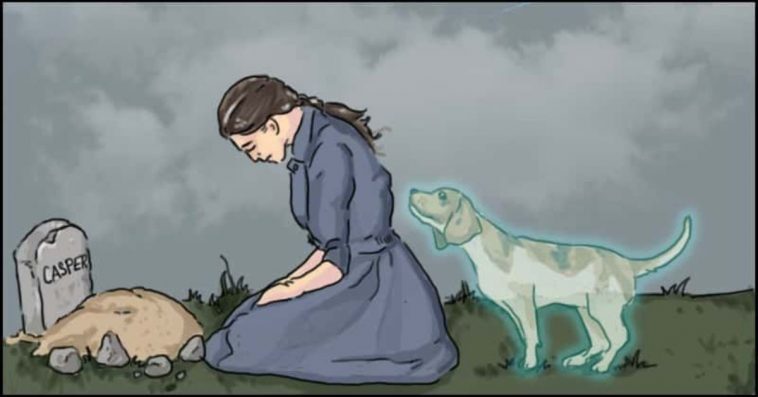Most individuals find it difficult to grieve the loss of a pet.
Pets, sometimes known as companion animals by researchers, are increasingly seen as family members. It is not surprising, then, that most individuals grieve the death of a pet as much, if not more than the death of a human friend or family member.
What makes the death of a pet so difficult? How can we deal with it more effectively?
Some people think it’s ridiculous to mourn the loss of a pet. Those people either never had a strong bond with a pet, never had one as a kid, or never truly experienced the unconditional love and affection that only an animal can bring.
Losing a cherished animal, whether through illness, accident, or euthanasia, is a devastating experience. Even if their death was foreseen owing to old age, the loss of their daily companionship is difficult to express. It’s like if you have a giant hole in your heart, and nothing in this world will ever be able to fill it as your lost pet did.
Even when we know it’s time and best to stop their pain and suffering, having our animals euthanized can be exceptionally heartbreaking.
In a study undertaken by researchers at the University of Pennsylvania (Quackenbush & Glickman, 1984), it was observed that people experienced the most distress and were most likely to experience extreme sadness when they had to euthanize their pets.
Unfortunately, many people do not comprehend pet loss or the significance of pets in a person’s life.
This can increase a pet owner’s sadness significantly. Instead of being comforted & heard by friends or family (what psychologists call validation), the person is told, “It was only a dog (or cat), get over it,” or “I’m not sure why you miss that cat (or dog) so terribly.” These unintentionally cruel remarks might add to a person’s sadness (Messam & Hart, 2019).
The researchers also mention:
Feeling guilty is a common component of mourning, especially if the owner is torn about the decision to euthanize or believes that proper care was not provided. Though it is becoming more socially acceptable, grief for an animal remains relatively neglected. Time off work, for example, is rarely an option.
What Can You Do to Feel Better After Losing A Pet

Photo Credits – Christin Lola Getty Images
It is never easy to lose a four-legged loved one. However, there are several things you can do both during & after the loss. It appears that having to euthanize our loved one presents unique challenges.
Being actively part of the decision-making process for ending a pet’s life, on the other hand, can frequently be beneficial, allowing a person to take some comfort in their passing.
While some people are distressed by memories of their deceased, such as cat/dog toys, bowls, and leashes, others find consolation in them. If they give you more stress, put them somewhere out of sight for a while.
You don’t have to get rid of them just yet, but it’s pointless to have them bring up bad memories or unhappiness.
The Rainbow Bridge is a common pet grieving topic since it implies that we shall all meet again in the hereafter. Knowing that we can rejoin a loved one when we die brings immense consolation.
Euthanasia is sometimes accompanied by remorseful feelings. It is a tremendous responsibility to decide when to end another being’s life. These emotions are very normal. But please understand that you took your pet’s life because it was their time.
You ended a period in which they were likely in agony or distress. There was no chance for recovery or additional treatment to provide both quantity and, more crucially, quality of life.
Your pet appreciated everything you did for them and all the affection you showered on them. They received as much as they gave and lived a life knowing they were liked and cared for by you. It was a partnership that benefited them as much as it did you.
Many pet owners consider their animals to be surrogate children. In this background, it is obvious why the loss of a pet may be so traumatic.
Losing a source of nonjudgmental, unconditional love in a person’s life is usually exceedingly traumatic, regardless of the source of that love. While some individuals do not comprehend this, pet owners almost always do.
Many owners seek peace in memorializing their pets (Messam & Hart, 2019). These events can include holding a funeral or wake for the pet (either privately or with close, trusted friends and family).
Some people like to make an online photo gallery, print photos, or even make a scrapbook or photo collage. Some people seek peace by cremating their pets and storing their ashes in a memorial box with their pets’ names engraved on top.
Grief coping tactics for pet loss frequently begin with reading pet loss bereavement articles (whether in a book or online) (Messam & Hart, 2019).
Other coping tactics include writing letters or blogs to the pet, socializing with other animals (such as at shelters), joining an online pet loss support group, staying busy with routines, seeing friends, and volunteering. In extreme circumstances of loss, it is fairly uncommon for a person to seek grieving treatment from a mental health professional.
How Long Will I Feel Sad?

Nobody knows how long your grief will continue. Loss and sorrow are highly individualized and thus vary considerably. According to one short study of 82 persons who had lost their pet, “25% took between 3 and 12 months to accept the death of their pet, 50% required between 12 and 19 months, and 25% needed between 2 and 6 years to recover” (Messam & Hart, 2019).
As you can see, the time it can take to recover properly from the loss of a pet varies greatly. This serves as a reminder that grieving takes as long as it needs to experience properly. There is nothing you can do to accelerate or deepen the experience. It comes when it arrives and lasts as long as it needs to.
You’ll get over your pet’s death. But you will never forget the love and fun you had together. Someday, you might even feel ready to offer your heart to another furry or feathered friend. Our hearts are big enough to accept a lot of love into our lives all the time.
I hope your weight is not too heavy during this tough time. Please remember that you are not alone and will get through this.


